RTA launches performance measures dashboards to track progress on strategic plan outcomes
October 4, 2023
October 4, 2023
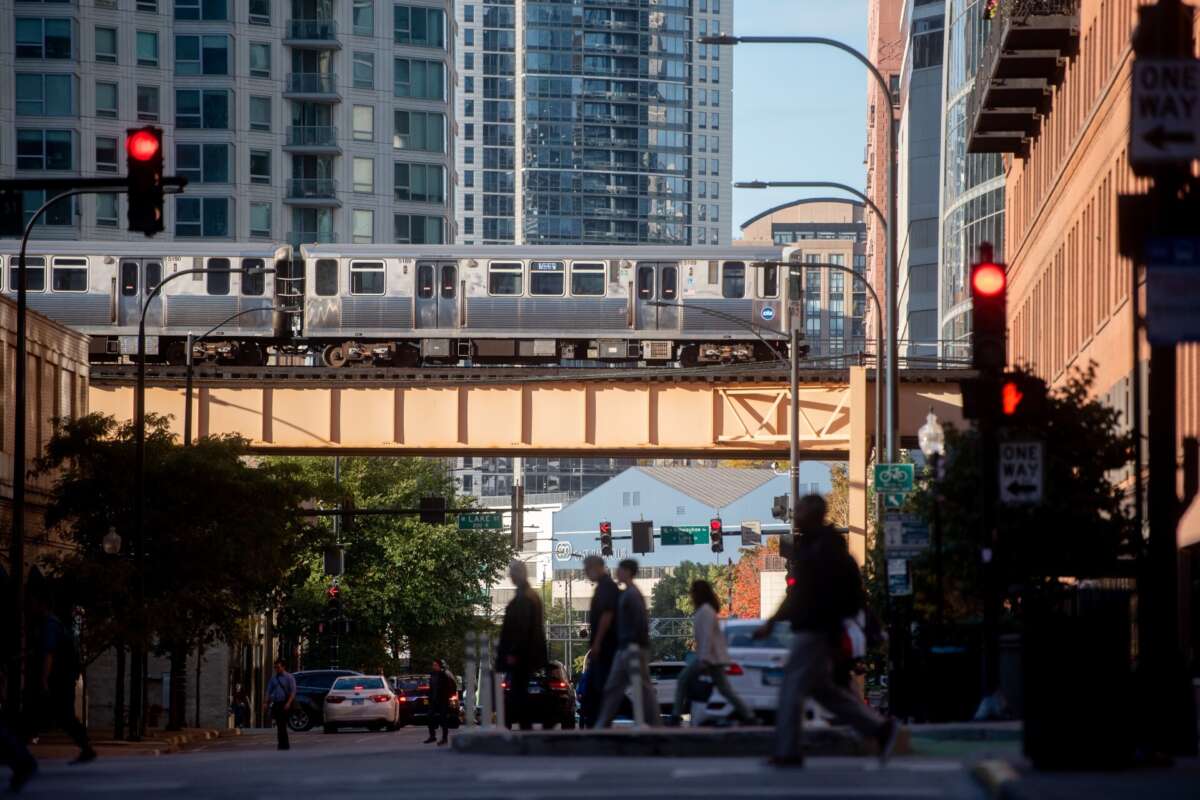
The RTA’s regional transit strategic plan, Transit is the Answer, identifies six key outcomes that are needed to achieve the plan’s vision of “safe, reliable, accessible public transportation that connects people to opportunity, advances equity, and combats climate change.” Three of these outcomes describe goals for the transit system: in a state of good repair; financially stable; and safe, accessible, reliable, and useful for riders. And three describe goals for the region: connected, winning the fight against climate change, and thriving.
In order to track progress toward these key outcomes—and to understand how outcomes may vary across communities, by race, by income, or by other important factors—the RTA has launched three Performance Measures Dashboards. The measures capture user experience, progress made in investing-in and maintaining transit infrastructure, and how well RTA and the Service Boards are maximizing use of our shared resources. Learn more about all the performance measures at TransitIsTheAnswer.org.
The first performance measures dashboard explores progress toward our transit system being in a state of good repair, including data on accessible stations, annual capital funding, annual capital expenditures, and miles between major mechanical failures. The metrics on this dashboard reflect whether the condition of the system’s capital assets (i.e., tracks, stations, and vehicles) are sufficient to operate at a full level of performance. Check back often; more metrics will be added to this dashboard in the future.
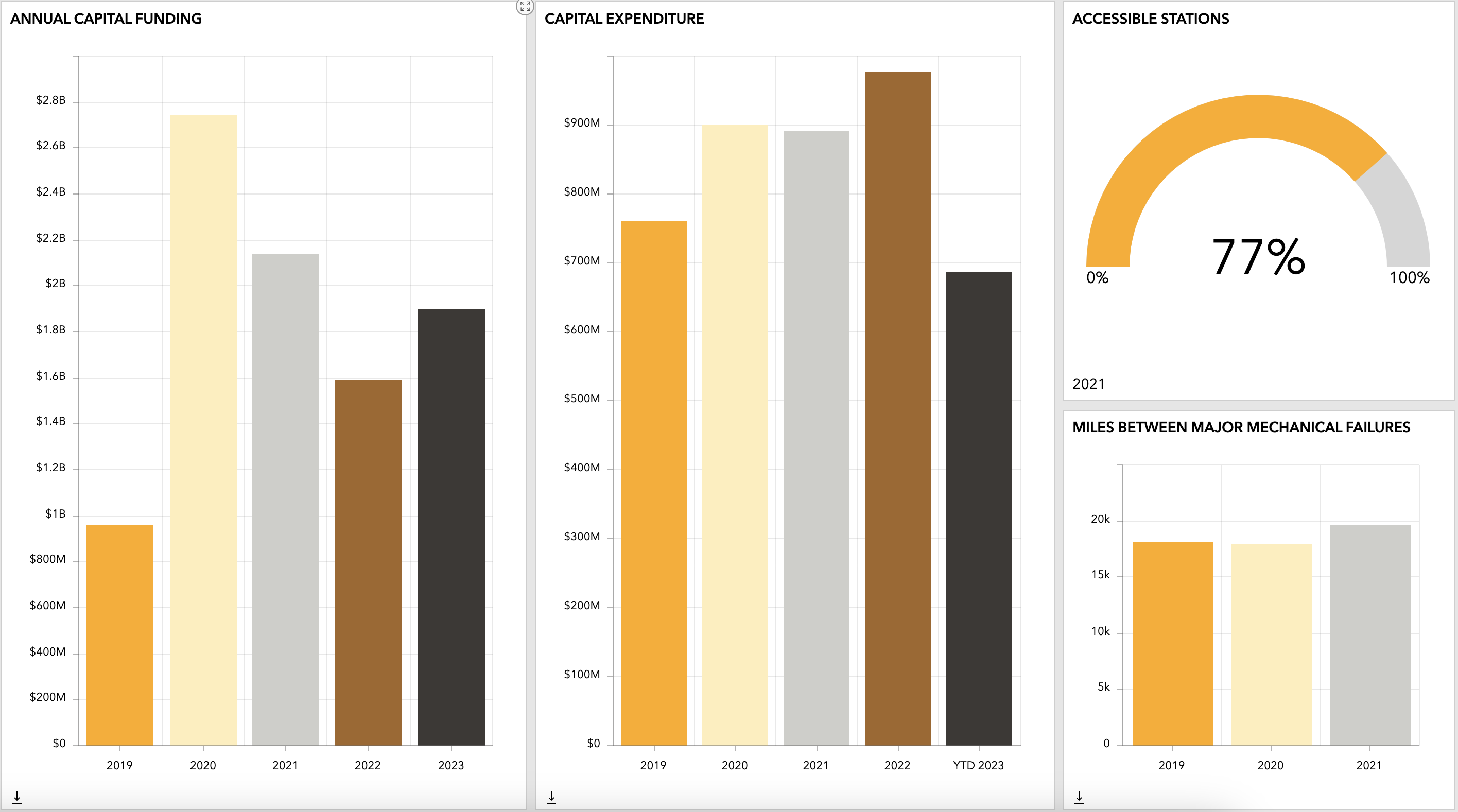
Current metrics on the dashboard include:
ADA-Accessible Stations are passenger facilities which, in compliance with ADA requirements, provide ready access and do not have physical barriers that prohibit and/or restrict access by individuals with disabilities, including individuals who use wheelchairs. The CTA’s All Stations Accessibility Program (ASAP) was launched in 2018 and promises 100 percent of stations being made fully accessible by 2038; the agency is already making progress on this goal, with more than 70% of its stations now fully accessible.
Annual Capital Funding are the amounts budgeted to be expended on capital projects for a given year. Funding allocated in one year is generally expended over a number of subsequent years as projects move through planning, design, and construction phases.
Capital Expenditures are expenses related to the purchase of capital equipment and financing capital projects. Learn more about how capital projects are evaluated in our blog on the topic.
Miles between Major Mechanical Failures are the average number of service miles that transit vehicles travel between failures of some mechanical element that prevents the vehicle from completing a scheduled trip or from starting the next scheduled trip due to limited actual movement or safety concerns.
This dashboard explores progress toward a financially stable transit system. All data are inflation-adjusted and shown over a period of five years.
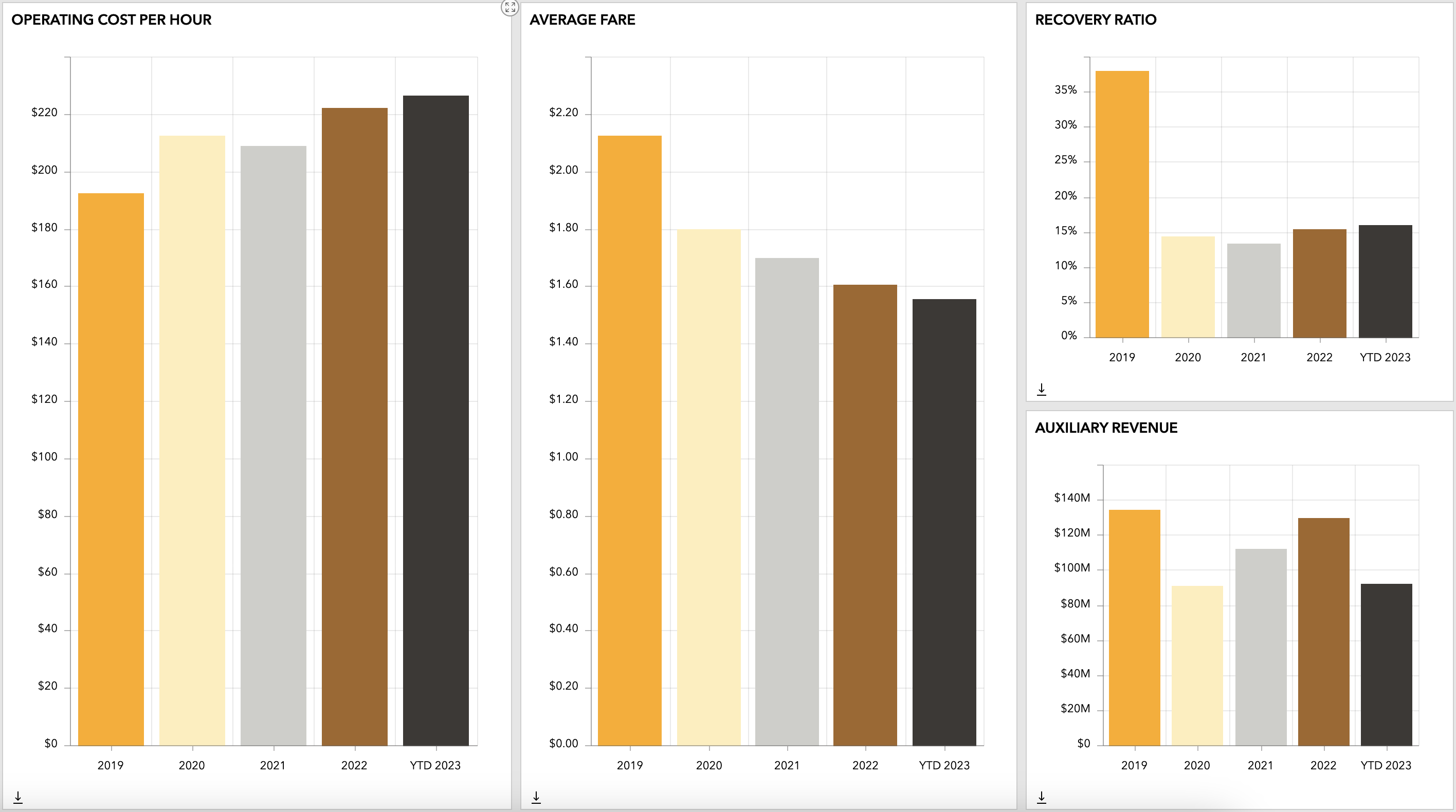
Operating Cost per Hour is the expense associated with the operation of the transit agency, per hour that vehicles travel while in revenue service.
Average Fare includes all income received directly from passengers, paid either in cash or through pre-paid tickets, passes, etc., divided by the total number of passenger trips taken, including reduced and free rides and transfers.
Recovery Ratio is the percentage of the operating cost of transit service that is covered by income received directly from passengers (paid either in cash or through pre-paid tickets, passes, etc.). So far in 2023, the recovery ratio for the system is at its highest post-pandemic level. While this is a good indicator of transit’s recovery, the RTA is advocating for reform to the farebox recovery ratio mandate, which is the strictest in the country.
Auxiliary Revenue results from business-type activities in which an agency earns supplemental revenues, including advertising and concessions.
The metrics on this dashboard reflect to what degree our transit system is safe, accessible, reliable, and useful to our riding public.
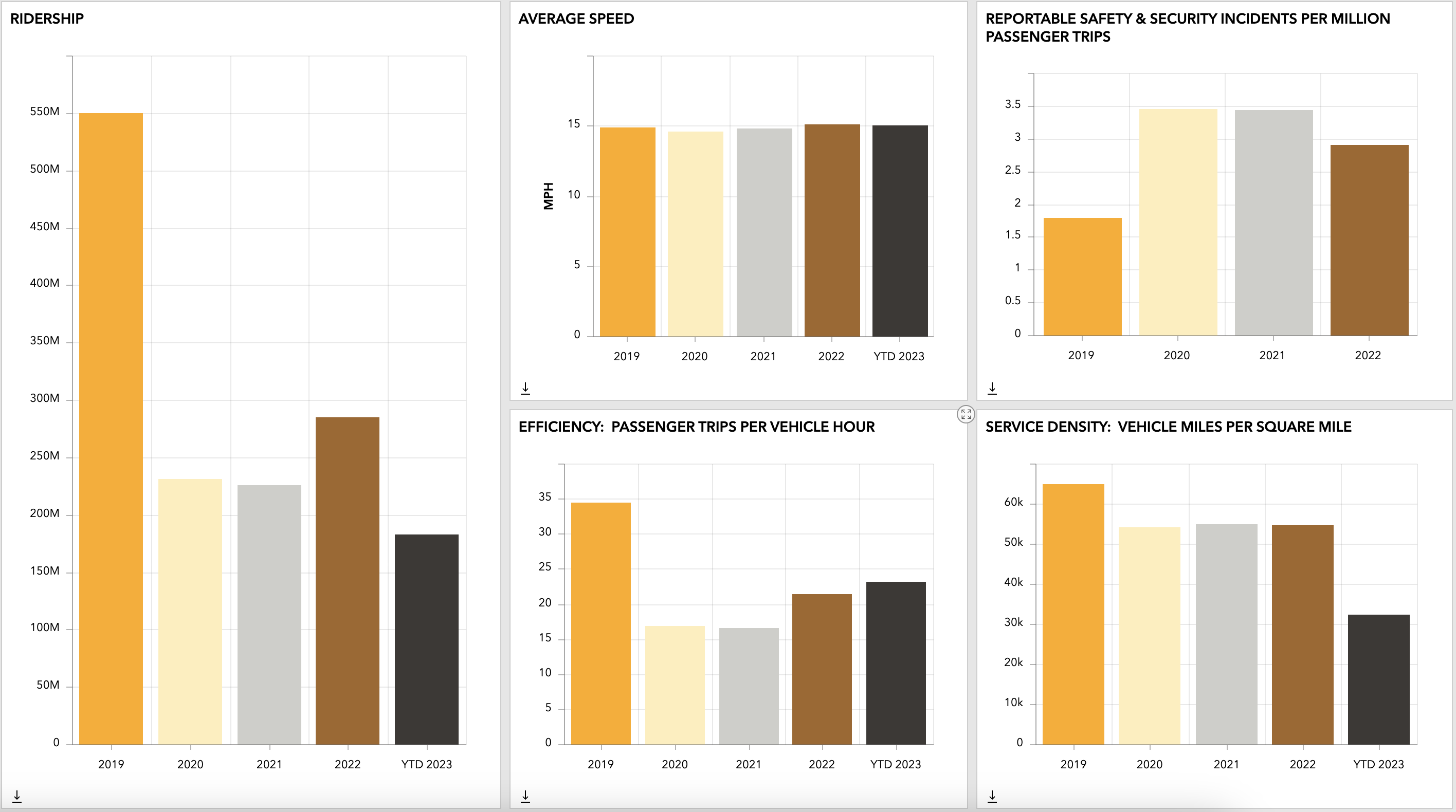
Ridership: total number of trips taken on transit service. So far, ridership for every month of 2023 has exceeded corresponding months’ ridership of 2022. All three Service Boards – the CTA, Metra, and Pace – have hit post-pandemic ridership milestones in recent weeks.
Average Speed is calculated as the total vehicle revenue miles divided by the total vehicle revenue hours.
Efficiency: the number of passenger trips per hour of transit service. The amount of service has increased by 2 percent in 2023 compared to 2022, but ridership is up 17 percent for the same period, indicating improved efficiency.
Reportable Events per Million Passenger Trips includes all safety and security incidents meeting the thresholds established by the Federal Transit Administration and Federal Railroad Administration (for commuter rail), expressed on a per million passenger trip basis.
Service Density: total annual vehicle miles of service per square mile of the transit operator’s service area.
Transit is the answer to many of the region’s challenges but is threatened by lack of sufficient operating and capital funding after years of disinvestment and a pandemic. Our region’s current transit funding structure is also overly reliant on fares. Together this leaves our transit agencies to face an existential crisis that neither fare hikes nor service cuts can solve while preserving a useful and equitable system. We need your help to win sustainable funding for transit and build a better system for everyone who relies on it. The Agenda for Advocacy and Action in this plan lays out a path to position the system for long-term success by seeking new funding, making improvements for riders, and supporting communities working to increase transit access.
We recognize we can’t do this alone. Many of the advocacy and action items in this plan are not under the control of RTA, CTA, Metra, and Pace. Leadership from a diverse group of elected officials, community leaders, and riders is needed to achieve meaningful change. Join the Transit is the Answer Coalition to stay engaged and advocate for our transit system.
View our other dashboards on the State of Transit and Finance.
Subscribe to our Newsletter
Related Articles
 Transit station activation in Uptown brings positive presence to Broadway bus route with weekly outdoor yoga class
Transit station activation in Uptown brings positive presence to Broadway bus route with weekly outdoor yoga class
On Friday mornings now through the end of the year, CTA #36 and #81 bus riders and Red Line passengers through the Uptown neighborhood of Chicago may catch a...
July 25, 2024 Join the RTA Transit is the Answer Coalition to discuss possible reforms to improve service and accountability for riders
Join the RTA Transit is the Answer Coalition to discuss possible reforms to improve service and accountability for riders
Following the introduction of legislation that proposes changes to how the Chicago region’s transit agencies are organized, the RTA continues to lead convers...
July 15, 2024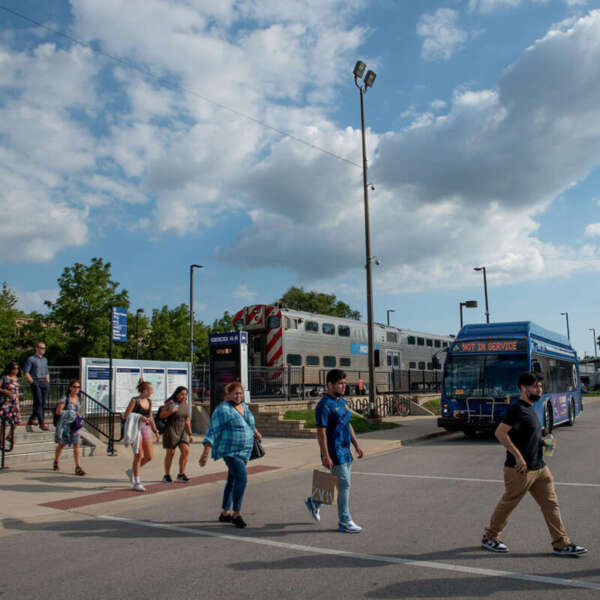 RTA releases new fare equity report, recommending fully funding and expanding reduced fare programs
RTA releases new fare equity report, recommending fully funding and expanding reduced fare programs
A new report released by the RTA in July, Building a More Equitable Fare Structure for Public Transit in the Chicago Region, recommends that the state legisl...
July 11, 2024 Homewood, Richton Park adopt transit-oriented development plans funded through RTA Community Planning program
Homewood, Richton Park adopt transit-oriented development plans funded through RTA Community Planning program
This spring, transit-oriented development (TOD) plans were adopted by the villages of Homewood and Richton Park that will make these communities more transit...
July 11, 2024 Good news: Regional transit ridership reaches new high as CTA, Metra, and Pace increase service, offer new fare products
Good news: Regional transit ridership reaches new high as CTA, Metra, and Pace increase service, offer new fare products
Ridership across Chicago’s transit system has continued to increase, with May 2024 seeing the highest ridership levels since 2019 for CTA, Metra, and Pace. T...
June 28, 2024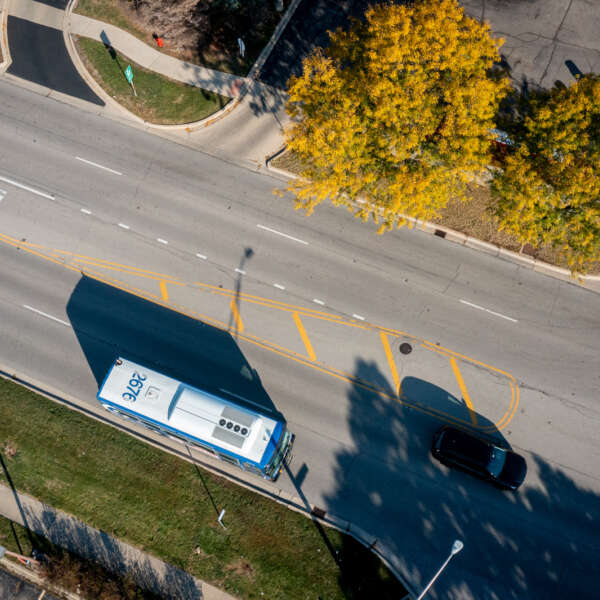 Legislative Update: Lawmakers pass state budget, action on transit funding still needed ahead of fiscal cliff
Legislative Update: Lawmakers pass state budget, action on transit funding still needed ahead of fiscal cliff
The Illinois General Assembly adjourned this year’s spring legislative session after passing an overall $53.1 billion budget for State Fiscal Year (SFY) 2025...
June 27, 2024